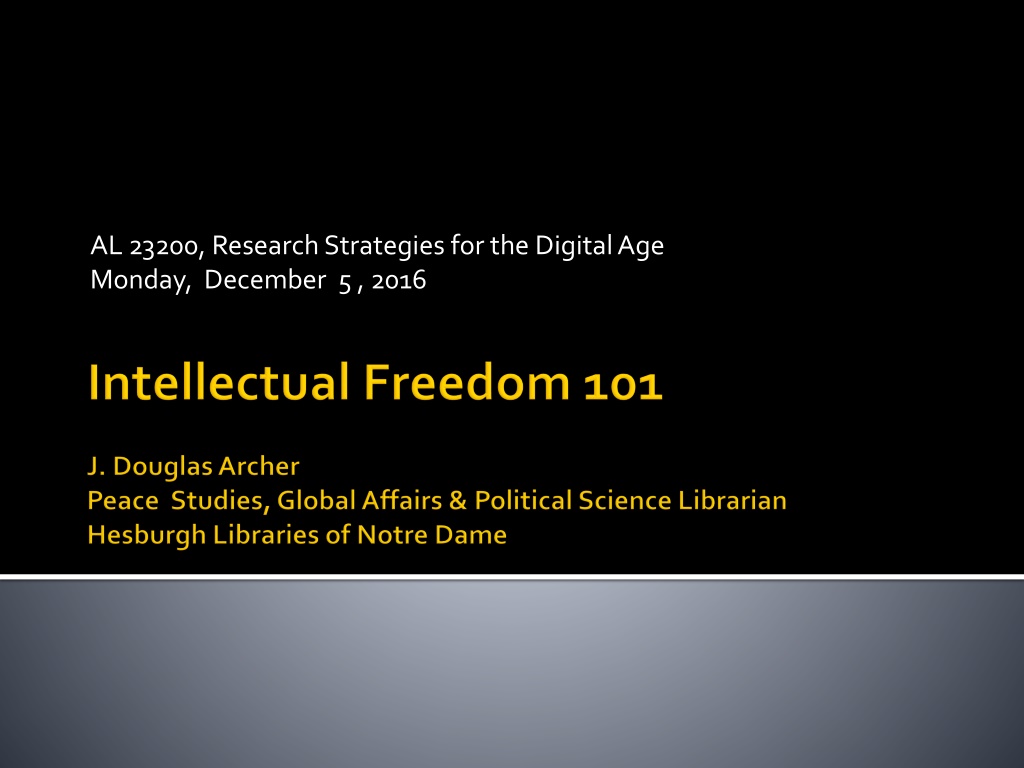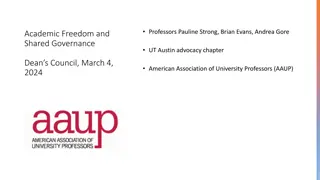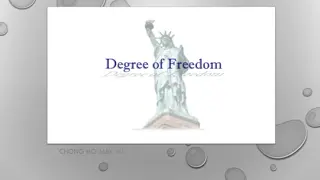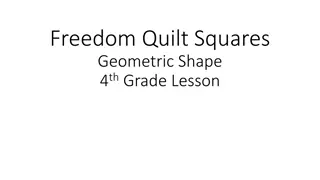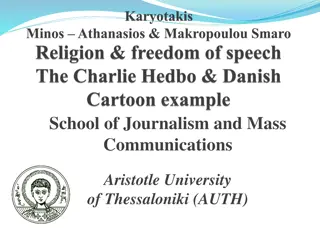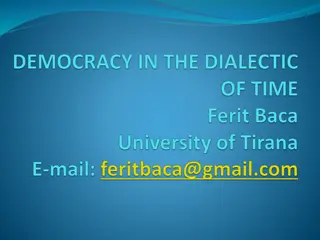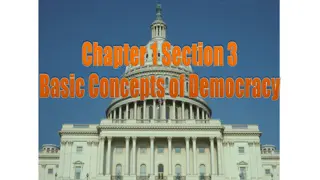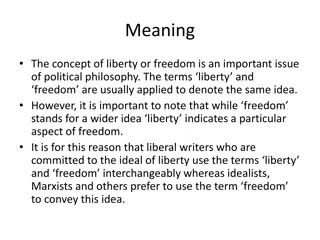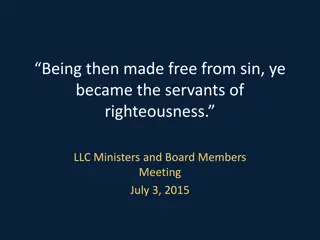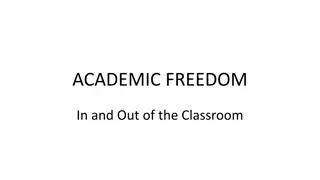Understanding Intellectual Freedom in American Society
Explore the concept of intellectual freedom as a core value in American society, emphasizing the importance of liberty, democracy, and the exchange of ideas. Academic and intellectual freedom are crucial for the advancement of knowledge and the functioning of a democratic society, allowing individuals to decide what they read, view, or listen to without censorship. Embrace positive and negative freedom, safeguarding the right to think, speak, and assemble freely.
Download Presentation

Please find below an Image/Link to download the presentation.
The content on the website is provided AS IS for your information and personal use only. It may not be sold, licensed, or shared on other websites without obtaining consent from the author. Download presentation by click this link. If you encounter any issues during the download, it is possible that the publisher has removed the file from their server.
E N D
Presentation Transcript
AL 23200, Research Strategies for the Digital Age Monday, December 5 , 2016
a greater understanding of Intellectual Freedom as a Core Value of American society in general and of American libraries in particular
Give me libertyor give me death! We hold these truths to be self-evident, that all men are created equal, that they are endowed by their Creator with certain unalienable Rights, that among these are Life,Liberty and the pursuit of Happiness. We the People of the United States, in Order to form a more perfect Union, establish Justice, insure domestic Tranquility, provide for the common defense, promote the general Welfare, and secure the Blessings of Liberty to ourselves and our Posterity, do ordain and . Congress shall make no law respecting an establishment of religion, or prohibiting the free exercise thereof; or abridging the freedom of speech, or of the press; or the right of the people peaceably to assemble, and to petition the Government for a redress of grievances. ... with libertyand justice for all.
Positive Freedom: to think, feel, believe, speak, write, publish, distribute & peacefully assemble Negative Freedom: from government restrictions on One s thoughts, feelings, beliefs, speech, writing, publishing, distribution & peaceful assembly.
ACADEMIC FREEDOM Context: The Academy. Who: The individual scholar, teacher, student, etc. What: Freedom to research, teach & publish in one s discipline. Threat: Loss of job, suppression of ideas, etc. and the consequent stifling of research and the advancement of knowledge
INTELLECTUAL FREEDOM Context: Libraries. Who: All Individual readers, viewers, listeners, etc. What: Freedom to access all constitutionally protected speech. Threat: Inability to access competing ideas, etc. and the consequent suppression of the exchange of ideas essential for a functioning democracy.
Intellectual Freedom exists when: You decide what you read, view, listen to or otherwise access. Censorship occurs when: Someone else (usually government) decides what you read, view, listen to or otherwise access.
No one wants to be censored! So why the problem? Most people have something that offends them and therefore are at least tempted to censor others. Somepeople want to control what other people can read or otherwise access. The difference between the two groups is what people do.
Religion: The Golden Rule Culture: Fair play & practicality What s good for the goose is good for the gander. I ll scratch your back; you scratch mine. The United States Constitution The Bill of Rights (Amendments 1-10)
Is the legal basis for intellectual freedom in the U. S. Is an integral part of the Constitution. IS NOT extra or an after thought. IS NOT legislation in the ordinary sense. IS NOT simply valued by the left OR right.
Cannotbe overridden by a majorty vote of or executive action by: Congress State Legislatures City Councils Federal Executive Branch State Executive Branch Mayors Library Boards
Can only be changed by Constitutional amendment Supreme Court interpretation Can be affected by Local community pressure
Reflects the memories and experiences of the Founders. Living memory of political persecution. Living memory religious persecution. Living experience of the abuse of the rights of English subjects by the British Crown
Remember the Context Suppression of free speech and the press during a long, bloody revolutionary war, a period of intense insecurity! Note similarity to our current situation!!!
Optimistic Established a republic Established a representative democracy Trusted the body politic Many Deists & Free Thinkers (e.g., Jefferson & Franklin)
Pessimistic Established checks & balances Wrote rights into the Constitution Did not trust individuals Many Calvinists
Religion (of, for and from) Press Speech Petition Assembly Five freedoms = intellectual freedom The freedom to read, view, listen to or access what you will with whom you will and to petition (complain) if you don t like it.
Our form of government is A republic and a representative democracy Not a monarchy, dictatorship, oligarchy or plutocracy where someone decides for us Therefore we need informedcitizens to elect informed representatives. a free marketplace of ideas in which to debate.
to receive information Courts have held that for the 1stAmendment to have meaning people have to be able to receive information. to privacy 48 states & DC have library confidentiality laws. 2 states have AG opinions protecting library records. Access library materials without fear of reprisal. a chilling effect on the exercise of fundamental rights
SCOTUS restrictions Exceptions Include: time place manner obscenity libel slander fighting words child porn national security & a very few more
Laws authorizing exceptions must address a compelling government interest and must be narrowly tailored Only a court can determine if speech is not protected.
1735 John Peter Zenger Newspapers, political expression 1919 Schenck v. United States -- "clear and present danger" 1925 Gitlow v. New York states & localities 1933 U.S. v. Ulysses obscenity, creative expression 1963 NYT v. Sullivan libel of public figures 1969 Brandenburgh v. Ohio "imminent lawless action 1971 NYT. v. United States prior restraint, Pentagon Papers 1980s + Media, indecency, Internet filtering, etc.
Censorship by government bodies is generally unconstitutional. Public libraries are government bodies. Private libraries are free to censor but generally don t. Calling for censorship isn t censorship per se. It s free speech! Choosing not to stock, sell, broadcast, publish, etc. is still censorship in the broadest sense but it is also a constitutional right. Parents can and should guide the reading, viewing or listening of their children -- but only their children.
Courts have applied the Bill of Rights to public libraries via the concept of a public forum. Traditional public forums Parks, sidewalks, etc. Any one may engage in constitutionally protected speech Limited or designated public forums Fairground grand stands School auditoriums after hours Public libraries
Public Libraries are designated, limited public forums for the receipt of information. may ban or regulate behavior that interferes with their purpose as a limited designated public forum. may designate and define space (e.g. meeting rooms, exhibit space and literature distribution space) for the exchange of information, etc. Once space is made available only time, place and manner restriction should be used not content or purpose.
The Absolutely True Diary of a Part-Time Indian, by Sherman Alexie Persepolis, by MarjaneSatrapi And Tango Makes Three, Justin Richardson and Peter Parnell The Bluest Eye, by Toni Morrison It s Perfectly Normal, by RobieHarris From ALA OIF s Ten Most Challenged List http://www.ala.org/bbooks/frequentlychallengedbooks
Books Leisure Reading Serious Lit Popular Lit Scientific Works Graphic Novels Scientific Articles Movies, DVDs, etc. Music CDs Pictures, Paintings Websites Displays Meetings Cartoons Comics Journal Articles Magazine Articles News Articles
Anti-ethnic Cultural Sensitivity Racism Sexism Anti-family Nudity Offensive Language Other offensive item Abortion Drugs/Smoking Gambling Gangs Violence Suicide Homosexuality Sexually explicit Political viewpoint Religious viewpoint Occult/Satanism Unsuitable to Age Group Inaccurate Technical error
Anywhere and Everywhere no geographical, social or economic limits Anyone no age, political, educational, ethnic, gender or religious limits from the left, right, middle and off the wall.
A professional policy document. Provides guidance for libraries & librarians. Is based on the Bill of Rights. Is not a legal document (no sanctions).
I. Books, etc. should: be provided for . . . all people of the community. not be excluded because of who created them. II. Books, etc. should: present all points of view . . . issues. not be excluded for partisan or doctrinal reasons. V. A person s right to use a library should not be denied or abridged
http://www.ala.org/ala/aboutala/offices/oif/index.cfm Interpretations of the LBOR Freedom to Read Statement Code of Professional Ethics Intellectual Freedom Manual
Balance means having a mix of resources representing all viewpoints on an issue of interest to a community within the library s fiscal restraints. Balance does not mean having an equal number of resources for two sides of an issue. There are always multiple sides to (viewpoints on) any issue.
Formats change Print on paper, microfilm, tapes, CDs, DVD, online, etc. With every new media comes the argument that things are now really different and that censorship is OK. But: Principles remain the same Only the practicalities differ
Greater impact than the Print Revolution Expanded, nearly universal access Expanded opportunities for good or evil Accuracy & integrity of the historical record challenged From fixed (printed on paper) To ephemeral (think of the cloud )
Libraries and individuals no longer own content. Libraries and individuals license access to content. Content is controlled by the rights holder. From First Amendment / Constitutional rights. To Contract law (licenses).
Potential threats to unfettered access and uncompromised content are increasing. Campaign websites Revised & Retracted journal articles Amazon and 1984
Privacy is a Prerequisite to full enjoyment of Intellectual Freedom the chilling effect No one s business but yours Self-evident No fear of misunderstanding Kittens and Biscuits No fear of untimely public exposure Child abuse, sexual abuse, anything intensely personal No fear of government retaliation Unpopular opinions
3 of 8 Principles Directly Relevant 2. We uphold the principles of intellectual freedom and resist all efforts to censor library resources. 3. We protect each library user's right to privacy and confidentiality with respect to information sought or received and resources consulted, borrowed, acquired or transmitted.
We distinguish between our personal convictions and professional duties and do not allow our personal beliefs to interfere with fair representation of the aims of our institutions or the provision of access to their information resources.
A good library has something to offend everyone!
LIBRARY ORANIZATIONS: Office for Intellectual Freedom. Intellectual Freedom Manual, 9thEd. (Chicago: ALA, 2015) _________. History of ALA Policy on Intellectual Freedom: A Supplement to the Intellectual Freedom Manual, 9thEd. (Chicago: ALA, 2015) _________. Choose Privacy Week: Resource Guide. (Chicago: ALA, 2009) ALA s Office for Intellectual Freedom http://www.ala.org/offices//oif Doyle, Robert. Banned Books: Challenging Our Freedom to Read. (Chicago: ALA. 2010) Freedom to Read Foundation http://www.ala.org/groups/affiliates/relatedgroups/freedomtoreadfoundation
1STAMENDMENT DEFENSE ORGANIZATIONS: American Civil Liberties Union https://www.aclu.org/ National Council of Teachers of English (NCTE) http://www.ncte.org/positions/censorship PEN International http://www.pen-international.org/ Media Coalition http://mediacoalition.org/ Electronic Frontier Foundation https://www.eff.org/
J. Douglas Archer Peace Studies, Global Affairs & Political Science Librarian 114 Hesburgh Library University of Notre Dame Notre Dame, IN 46556 574-631-6656 voice archer.1@nd.edu www.nd.edu/~jarcher Member & Past Chair, ALA Intellectual Freedom Committee Past Chair, IFL Intellectual Freedom Committee Member, Freedom to Read Foundation, Board of Directors Trustee, Leroy C. Merritt Humanitarian Fund ALA Councilor at Large
